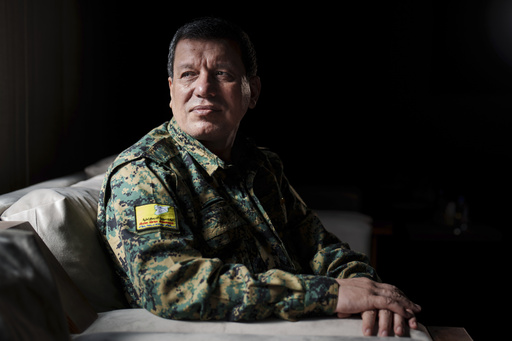
HASSAKEH, Syria — The leader of the Kurdish-led Syrian Democratic Forces (SDF) has emphasized the need for a secular, civil, and decentralized state following the recent removal of the Assad family from power. Mazloum Abdi stated in an interview that he had met with Ahmad al-Sharaa, the newly appointed interim president of Syria, in Damascus, where discussions were held, with mediators assisting in the talks, to negotiate the future of Syria and the role of the Kurds in it.
Abdi maintained that the presence of U.S. forces in Syria is crucial, as their withdrawal could enable the Islamic State group to regain strength, endangering the entire region’s security.
The Assad family’s leadership, which lasted for over 54 years, officially ended in early December when insurgents from the Islamist group Hayat Tahrir al-Sham (HTS) seized control of Damascus. President Bashar Assad’s fall on December 8 followed nearly 14 years of conflict, resulting in substantial loss of life—over half a million people—and displacing half of the Syrian population.
During a recent meeting, the factions responsible for Assad’s downfall designated HTS leader al-Sharaa as interim president, dissolving the existing constitution crafted by Assad in 2012, along with the military and notorious security services of Syria.
Abdi expressed that the regime’s collapse represents a historic moment, and it provides an opportunity to establish a new Syria devoid of the Baath party’s influence. “We want to move Syria forward together,” he stated, signaling a collective vision for the nation’s future.
When asked about the recent meeting in which al-Sharaa was appointed and significant governmental structures were dissolved, Abdi noted that the SDF was not involved in those discussions. He indicated that negotiations are ongoing between al-Sharaa’s administration and the SDF, and the SDF’s stance will depend on these outcomes.
Efforts will continue to foster dialogue between SDF representatives and the new authorities in Syria, focusing on how the country should evolve in the future. Abdi highlighted that members of the U.S.-led coalition against ISIS, including nations like the United States, the United Kingdom, and France, are facilitating mediation efforts between the SDF and the Damascus government, although he did not provide specifics.
He expressed the SDF’s desire for a unified Syria under a central government in Damascus, advocating for a model grounded in democracy that acknowledges the rights of all cultural and religious groups in the country, ranging from Sunni Muslims and Christians to various ethnicities including Arabs, Kurds, Turkmen, and Armenians.
Abdi stressed that Syria is a diverse nation and should not be perceived as solely a Sunni state, acknowledging that while Sunni Muslims represent the majority, there exists a myriad of other identities within its borders. Concerns regarding HTS’s potential inclination towards establishing an Islamic state have been voiced. However, Abdi noted that al-Sharaa has sought to promote religious coexistence in recent years, distancing himself from prior extremist positions.
While the Kurds aim for decentralization, Abdi clarified that they do not wish to pursue independence or establish a separate autonomous government akin to that of Iraq’s Kurdistan region. He stated that the local populace in northeastern Syria desires to manage their affairs within a framework of a decentralized Syria, distinguishing it from Iraq’s administrative structure.
Most former insurgent groups have agreed to integrate into the new military and security framework, but the exact implementation remains uncertain. Despite conversations around integration, the SDF has not yet committed to disbandment. When questioned about the possibility of dissolving the SDF, Abdi expressed a willingness to be included in Syria’s defense efforts, necessitating discussion on specific details, and indicated a proposal had been submitted to Damascus, awaiting feedback.
Turning attention to the Islamic State, which the SDF has been instrumental in combating, Abdi pointed out that since the regime’s collapse, ISIS has exploited the situation to seize weapons from abandoned military posts, posing a renewed threat.
Abdi reiterated his call for U.S. troops to maintain their presence in Syria, illustrating the ongoing need for their role in countering ISIS. Following a partial withdrawal decision made by former President Donald Trump in 2019, which was later halted, Abdi emphasized that the conditions necessitating U.S. support remain intact. “We hope that the coalition does not withdraw,” he concluded, affirming their uninformed status regarding any American plans to leave Syria, and urging the U.S. to remain engaged.

